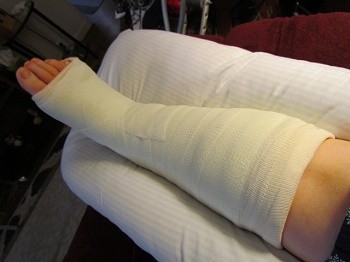Some injuries may leave you with a permanent disability that may or may not affect your ability to work.

Oftentimes when an injury is sustained on the job, an employer will cite the older disability as causing the need for medical attention and will terminate the employee’s benefits before they are fully recovered. If this has happened to you, you should contact a St. Louis workers’ compensation attorney immediately and request that your case be heard by the labor board.
When Workers’ Compensation Benefits Are Given
An injured employee needs to be aware that workers’ compensation benefits may be allowed in the event that an injury or accident exacerbates the pain or injury from a prior incident. There are situations where you may be given benefits from a second injury fund, but that is in the event that the first injury was also work-related.
Receiving Permanent Disability Despite a Previous Injury
Employers and their workers’ compensation insurers may try and get around this, especially when there is permanent injury involved. Take for example a St. Louis truck driver who was clearly hurt by an accident while he was at work. While closing a heavy gate at a terminal, it dropped forward and injured his arm, back, neck, and shoulder; places where he had been hurt many years before in an unrelated bicycle accident. When the employer received his maximum medical improvement from the treating physician, it came with lifting constrictions that the employer did not wish to oblige. As a result, the employee was forced to rely on unemployment since the discharging doctor did not feel as if his injury warranted a permanent disability.
Upon further testing, it was decided that the injury to the shoulder was a permanent disability, which the employer argued was a result of the prior accident, not the one related to the workplace injury. The matter was taken to the labor board, who after careful consideration decided that although there may have been a lingering injury, the new accident was the primary cause of disability, making the employer liable for all medical treatment and loss of wages. At the conclusion it was found that the employer was responsible for over $120,000 in medical care and lost wages, including the interest that had accrued.
How to Receive Your Rightful Compensation
Cases such as this one are seen often, as large companies attempt to avoid having to make big insurance payouts. They have the means to keep the case on-going, thus depriving you of your rightful compensation. That is why it is necessary to get in touch with a qualified St. Louis workers’ compensation attorney as quickly as possible. If you are having a difficult time getting doctor’s bills paid or have had your benefits denied, call The Law Office of James M. Hoffmann at (314) 361-4300 for a free consultation.
Work Related Injuries
Work Related ACL Injury
Leg Amputation
Finger Amputation
Ankle Injury
Ankle Replacement
Arthroscopic Surgery
Work Related Arthritis
Accidental Asphyxiation
Work Related Asthma
Avulsion Injury
Back Injury at Work
Back Pain from Work
Lower Back Pain at Work
Chronic Back Pain
Head Injury Internal Bleeding
Internal Bleeding after Injury
Blood Related Illness
Broken Bones
Brain Injuries
Traumatic Brain Injury
Bursitis Work Related
Burn Injury at Work
Electric Burn
Chemical Burn
Calcaneus Fracture
Sudden Cardiac Arrest
Cardiovascular Disease
Carpal Tunnel Work Related
Cartilage Injury
Cervical Disc Replacement
Cervical Fusion
Chronic Illness
Work Related Chronic Pain
Work Related Concussion
Contagious Disease
Work Related COPD
Skin Corrosion
CRPS Disease
Crush Injuries
Cubital Tunnel Syndrome
Work Related Death
Degenerative Bone Disease
Degenerative Disc Disease Work Related
Reflex Sympathetic Dystrophy
Work Related Tennis Elbow
Elbow Injury
Epicondylitis at Work
Work Related Eye Injury
Fibromyalgia
Work Related Foot Injuries
Work Related Injuries to the Hand
Hand Arm Vibration Syndrome
Work Related Head Injury
Closed Head Injury
Open Head Injury
Work Related Hearing Loss
Heart Attack Work Related
Stroke at Work
Heat Stroke at Work
Intracerebral Hemorrhage
Hernia Work Related Injury
Work Related Herniated Disc
Hip Fracture
Hip Replacement
Hip Injuries
Intracranial Injury
Broken Jaw
Work Related Knee Injuries
Knee Fracture
Laceration
LCL Injury
Legionnaires Disease
Ligament Tear
Limb Loss
Lumbar Disc Replacement
Lumbar Fusion
Lumbar Spinal Fusion
MCL Tear
MCL Injury
Meniscus Tear
Work Related Mental Illness
Mesothelioma from Work
Work Related Muscle Problems
Work Related Neck Pain
Work Related Neck Injury
Nerve Damage from Work Related Injury
Neurological Disorders
Occupational Disease
Organ Damage
Pain and Suffering from Work Related Injury
Paralysis
Patella Fracture
Pelvic Fracture
Plantar Fascitis
Pre Existing Work Related Injury
Work Related PTSD
Radiation Sickness
Repetitive Stress Injury
Rhabdomyolysis
Rotator Cuff Tear
Rotator Cuff Surgery
Work Related Rotator Cuff Injury
Sciatica Work Related
Shift Work Disorder
Shoulder Fusion
Shoulder Impingement
Shoulder Injury
Work Related Shoulder Pain
Sick Building Syndrome
Skull Fracture
Spinal Cord Injury at Work
Spondylolysis
Sprain at Work
Work Related Repetitive Strain Injury
Work Related Stress
Stress Fracture
Subdural Hematoma
Work Related Tendonitis
Lost Tooth at Work
Trigger Finger Work Related
Vertebroplasty
Vision Impairment
Lost Vision at Work
Work Related Wrist Injuries
Photo credit: Audrey via Flickr
